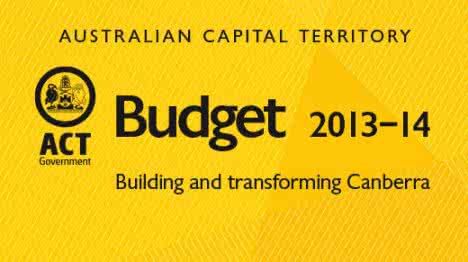The Childers Group has been busy beavering away behind the scenes, contributing a submission to the development of the ACT Government’s budget for 2013/2014, providing feedback on the resultant budget, and also attending the associated ACT Legislative Assembly hearing process (we hope to be able to link to the Hansard report shortly). However, we’re also working on our next forum, which will focus on arts review and criticism and is to occur on Friday 18 October, noon to 2pm, at the Gorman House Arts Centre in Braddon, ACT. We’ll be providing more details shortly, but ink it in – to say the least, it’s going to be an interesting discussion!
Monthly Archives: June 2013
The 2013-14 ACT budget and the arts: what we reckon
 On Tuesday 4 June 2013 the ACT Government released its budget for 2013-2014. Here is the Childers Group’s response to the arts component.
On Tuesday 4 June 2013 the ACT Government released its budget for 2013-2014. Here is the Childers Group’s response to the arts component.
In the Childers Group’s budget submission dated 25 February 2013, a number of priority areas were identified, based on feedback provided through our two well-attended public forums and the various formal and informal discussions we’ve had over the last two years.
We consider the following the most critical:
- The realistic support of key arts organisations – ensure that through the ACT Arts Fund CPI continues to be provided to Key Arts Organisations on an annual basis.
- Appropriate pay for arts workers – ensure that there are no professional arts workers employed by Key Arts Organisations earning less than the average Australian wage of approximately $55,000 per annum
- Private-sector philanthropy – there is an urgent need for an incentives-based approach that brings together business and arts in the ACT, not necessarily paying an individual to broker relationships but rather developing a suite of strategic benefits for investment by business and individuals in the arts. We strongly advocate for the ACT Government to provide seed-funding in the first instance.
What are our views on the ACT Budget in relation to our prority areas?
We applaud the ACT Government on its investment in the arts, particularly in relation to the following (although we note that not all of the funding below is ‘new money’):
New Works:
- $1.8 million upgrade Canberra Theatre
- $1.5 million Ainslie Arts Centre
- $1 million Gorman House Arts Centre over 2 years
- $300,000 to progress the Kingston visual arts hub
Works in progress:
- $80,000 Belconnen Arts Centre feasibility and forward design
- $3.6m allocated to the Fitters’ Workshop
Events:
- $3.6 million Enlighten
- ongoing funding to the Multicultural Festival and associated Fringe event
- please note: we advise that the ACT Government, in collaboration with the ACT-region arts sector, should actively seek ways to build connections for ACT artists with this events
 However, we remain concerned that the financial sustainability of the ACT’s key arts organisations does not appear to be addressed. All key arts organisations deliver a wide variety of professional programs, including those relating to community engagement and participation, as required by the ACT Government and to try to meet community need, but they do so with dwindling resources.
However, we remain concerned that the financial sustainability of the ACT’s key arts organisations does not appear to be addressed. All key arts organisations deliver a wide variety of professional programs, including those relating to community engagement and participation, as required by the ACT Government and to try to meet community need, but they do so with dwindling resources.
A critical issue is superannuation and long-service leave provisions. The increase in superannuation up to 12% begins in 2013 and increases steadily over the next five years and will have an impact on all funding, for organisations and one-off projects. The position of arts organisations in relation to retaining staff and meeting ACT long-service leave obligations is also a real and increasing cost attached to the $55,000 per annum figure mentioned above. The arts have legal and moral employment obligations like any other business and if there is a commitment to addressing retention of artists and arts staff in the ACT then there are real costs attached to that – arguably more so than other states e.g. there are greater long-service leave obligations in the ACT.
It should be noted that retaining and attracting skilled arts managers is now problematic as the ACT is not keeping abreast with salaries for senior personnel managing key ACT Government arts facilities. The investment in arts facilities and the resulting hubs requires highly skilled expertise to both manage and fully develop those hubs, through astute programming and strong community engagement.
What other areas of concern do we have with the ACT Budget?
Regarding the ‘disbanding of the ACT Cultural Council’ (as it is referred to in the 2013-2014 Budget Papers), the Childers Group believes that the Cultural Council model had served its purpose but no longer is it the model to best be a conduit between the ACT-region arts community and the ACT Government. However, we do seek clarification on what mechanism(s), if any, will replace the Council. The Loxton Review of the Arts recommended the establishment of a ‘Ministerial Arts Advisory Council’ – is this still being established? If so, what will its role be, and how will it be funded? If not, how does the ACT Government see it being kept informed of issues in the sector?
We understand that the ACT Government remains committed to peer-assessment of arts grants applications. However, we suggest that there is need for clear communication about how the various strands of arts funding will be assessed. For example, will Key Arts Organisation funding be assessed through a different mechanism than Program and Project funding? Additionally, will peers be paid? If so, has a budget been allocated for this?
We believe these matters are critical for our sector and request clarification on how the ACT Government intends to proceed, particularly given the upcoming assessment of a number of key arts organisations’ funding arrangements (5-year) in the very near future.
Do we think that the ACT Budget has addressed the issues raised in our submission?
The Childers Group fully recognises that these are challenging economic times internationally, nationally and locally, and that governments at all levels must make difficult decisions. In this context, we again congratulate the ACT Government for maintaining its investment in the arts. However, on top of the priorities already mentioned in this survey response, we reiterate the following areas where the ACT Government can and should make a contribution:
- Ongoing funding of the You Are Here festival – this initiative has been one of the Centenary of Canberra’s great successes, meaning that emerging and divergent art-forms flourish in a professionally curated context, whilst enlivening the city centre.
- Increased support for one-off arts activities – the Project Funding category is – regrettably – supporting fewer projects each year due to the increasing cost of delivering arts projects; this is especially true of the performing arts.
- Improved arts publicity and promotion services – the Childers Group believes that with a more strategic approach cultural tourism could be strengthened in our region. The Childers Group has met with ACT Tourism to encourage a more entrepreneurial approach to Regional Cultural Tourism. We believe incorporating regional attractions, including the district’s superb wineries and small galleries, will result in greater awareness of the distinctive creativity in our region.
- A dance hub – a review by AusdanceACT found that there is an urgent need for good dance facilities in the ACT, particularly for professional practice.
- A world-class artist-in-residence program – the Childers Group strongly advocates for ongoing funding of $200,000 over the next four years in order to fully realise the potential of its artist-in-residence program.
- Significantly enhanced arts-in-education services – the establishment of an Arts-in-Education Officer position would build relationships, partnerships and programs between the Education Directorate and the Community Services Directorate.
- A whole-of-government service approach to arts development – encouraging all directorates and agencies to examine ways in which they may directly or indirectly support the arts would enhance cultural life in Canberra.
- Building creative partnerships with the regions – in many ways the ACT not only services the arts and cultural needs of its own citizens but also those who live in the neighbouring regions. The regions have their own strengths and challenges, but greater partnerships between the ACT and the regions would result in deeper and more diverse opportunities.
The Childers Group is open to feedback on the above. Our email address is childersgroup@gmail.com.
You’re also very welcome to follow us on Facebook and Twitter.


